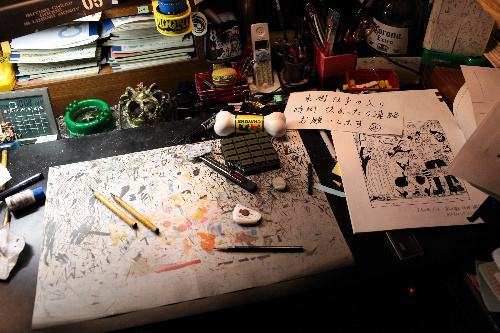I dedicate this piece to the late and endeared Kentaro Miura, author of Berserk and Master of the storytelling medium that is manga.
For many of us, anime and manga serve as an escape from the hardships of daily life, or as pieces of inspiration to conquer those hardships. Manga gives us stories like One Piece that show the inherent conflict between the desire and attempt to live freely while living in a class society based on extortion facilitated by an overwhelmingly powerful military political force. Manga also gives us stories like Cowboy Bebop, where the listless protagonist traverses through their alienation and poverty in a world where the vestiges and misery of capitalism have expanded throughout the solar system. And it gives us stories like Clannad which depicts a slice of life for a lonely young boy who slowly discovers the fulfillment brought by deep connections.
This industry that is growing in the US is providing us with a wider array of stories and new sources of excitement to stimulate our hearts and minds. That is why it’s important for us to not only recognize the labor that goes into realizing these stories, but as socialists and ani/manga fans, to also pay attention to the exploitation brought by class dynamics that hurt the stories as and maims and kills those who make them.
Conditions of Mangaka
In general, the working conditions most sectors of labor in Japan are overbearing. Often workers have to put in outrageous hours like 37 hours straight or 100 hours of (unpaid) overtime a month due to the demand of their jobs. Workers often don’t get enough sleep or suffer medical conditions from overwork like high blood pressure. Due to these conditions, what is called Karoshi (death by overwork) often occurs where workers die by medical conditions or suicide as a direct result of the sheer stress of their workload. This happened to beloved Mangaka Kentaro Miura, author of the legendary series Berserk who died at 54 by Aortic Dissection, a rare condition caused by high blood pressure.
Every week or every month manga fans like myself run to their regular manga sites to check out the newest chapters of our favorite series. This form of serialization adds a layer of suspense for fans. I always rush to read the new chapters to have questions that came about the week before answered or to see how a tense moment that was left at a cliffhanger progresses, just to have those questions or tensions deepened by the newest chapter. It makes the story feel more like a journey riddled with hardships and revelations of a constantly growing world with characters constantly growing through those conditions, just as every day working class people do. But as enjoyable as this serialization is, the conditions mangaka (manga authors) are forced to go through to meet those deadlines are grueling.
Above is an example of how a mangaka’s schedule could look in a given week. Where they only have a measly 3 hours a week of free time to think about and/or do anything unrelated to their given series. Getting a full eight hours of sleep is unlikely, and they often have to skip meals. A longer series could have a weekly serialization that lasts as long as twenty years or even longer to which these conditions have to be endured.
Furthermore, most of their work time is spent either drawing the storyboard, manuscripts (final drafts) or color illustrations. That much drawing can lead to serious and very painful health issues such as carpal tunnel and back pain. Last year, Yoshihiro Togashi, author of both highly acclaimed series’ Hunter x Hunter and Yu Yu Hakusho, who is currently on a writing hiatus, brought to light his being unable to draw normally in a chair or desk due to excruciating back and hip pain and that the only way he can physically draw is by laying down on his back. He also mentions that most movements take him three to five times longer than a normal person due to his condition. Whenever the Hunter x Hunter returns, it will no longer be a weekly serialization due to the toll it’s taken on the beloved Mangaka.
Mangaka who reach high levels of success can ease their workload by hiring a team of other illustrators to help them draw things like backgrounds, but even with these accommodations, it is still a struggle to write and draw their manga. Lesser known Mangaka who can’t afford to hire a team, are responsible for all the tasks required to write a story. Essentially, one person is left to take up the workload of an entire team, contributing to a strenuous 7-day a week schedule like the one shown above.
Lesser known Manga artists also live very precariously. Generally, artists are paid by a contractually agreed monthly page count and royalties on the number of volumes sold. A manga artist who is just starting will not receive much from volume sales and the number of pages they can publish is determined by the demand for their story which will also be low. Due to this, Mangaka often have to get second jobs as school teachers and college professors. Meanwhile, major publishers such as Shueisha reported having net sales of 195.2 billion yen (1.3 billion dollars) in sales in 2021.
As it is for all companies, especially billion dollar companies, Shueisha is able to hoard so much wealth because of its harsh exploitation of its workers. This situation is not so different from what part-time UPS workers experience: forced to work in precarious positions where they can’t earn enough to survive while sacrificing their backs to the profits of a corporate behemoth.
Labor Movement in Japan
With conditions like these, the natural question is if there is a movement to fight back this level of exploitation. The answer, unfortunately, is no. Not because mangaka lack anger or a willingness to take action, in fact, mangaka are very open about their frustrations like Takeuichi Naoko, the creator of Sailor Moon, who explained her burnout at length in her memoir. There are multiple reasons for the lack of push back in the industry that range from the way the labor itself is organized and the overall state of the labor movement in Japan.
Mangaka, like artists here in the US, are independently based workers who get work through contract agreements with publishers. Their work is not based in a “shop” with other workers under a more permanent employer, like it is for warehouse workers or teachers . This isolates mangaka from one another and stifles their ability to organize and take action in a coordinated manner. This also makes “troublemakers” an easier target for the publishers to punish and can hurt an author’s chance of getting contracts in the future.
Also the state of the Japanese labor movement has been at a steady decline since the 1960s. Union density fell from 32% in 1960 to 17.7% in 2013 and labor disputes followed by industrial action fell from 1,707 in 1960 to 71 in 2013. A historical example that contributed to this decline was the defeat of the massive national railway strike in 1975 where the Japanese National Railway Union staged a nation-wide strike to fight for the legal right of public sector workers to strike. Morale was not completely lost at this point, but unionization rates began to fall. Then, following that defeat came the privatization of the telegraph and telephone companies, tobacco & salt, and the National Railway, which only further fueled the union bureaucracies’ tepid approach towards labor that relied less on collective action than top-down compromises.
Furthermore, the state is very repressive towards strikes and is constantly poised to crush or disallow them. For example strikes in Japan must be considered “proper” to be permitted by the state. However, this is broadly defined for the purpose justifying repression of strikes, especially political strikes. Sympathy strikes, where workers in one sector or company strike in solidarity with workers in other striking sectors, are illegal. Therefore, it is not only illegal for strikes to be political in their purpose, but also cannot be politicized by calling on support from other sectors of labor.
There is also a jobs for life system in Japan (Shūshin-Koyō ) in which a percentage of workers will receive, as the name implies, jobs for life through permanent contracts and retirement allowances; while workers in the same sector or even the same shop who don’t have it don’t receive the same benefits even if they are doing the exact same work. Non-beneficiaries tend to be women. This impacts workers the same way as the two-tier system, in that it divides workers in a shop and places them against each other by giving one group material benefits over the other. Yet still, this concession itself is under attack by bosses who aspire to have more flexibility to hire and fire in order to threaten and discipline workers.
The mix of major defeats, a repressive state apparatus, privatization, the tepid nature of the union bureaucracy, and divisions amongst the Japanese working class have led to a major retreat of labor militancy in Japan that impacts all sectors, even Manga, where organizing is already difficult by the nature of the work.
Although labor is in a state of retreat in Japan, discontent amongst workers towards overtime culture is prevalent. There are criticisms against the government and employers for overworking people, with campaigns organizing to put a legal limit on the amount of overtime employees can work. These campaigns started with coalitions of citizens’ groups, unions, academics, and labor lawyers suing employers over negligence concerning overwork to win compensation for families of those who died by karoshi. Activists have also pressured Japan’s Ministry of Health, Labor, and Welfare to expose the names of companies with cases of Karoshi as a means to publicly shame them for overworking employees. Also with the high profile deaths of Mangaka like Kentaro Miura, there is more solidarity towards the Japanese working class, including mangaka, who are enduring these grueling conditions.
This discontent can be seized upon with more radical and combative means. Unions in Japan could campaign for greater solidarity across sectors against this exhaustive trend in labor that is culturally recognized. This discontent can be organized to challenge anti-strike laws that have allowed these trends to take over in order to win greater rights for workers and revitalize a labor movement that has been in retreat for decades.
The mangaka who have given their blood, sweat and passion to give us incredible artwork and stories to empathize with and be inspired by, are real life heroes of mine and many others. Yet, the same capitalists who create these conditions we’re forced to endure, take their lives and freedom away the same way they do ours. Therefore as an act of international working class solidarity it is up to us to denounce the exploitation that killed Kentaro Miura and other unmentioned mangaka who were lesser known, but not less important, and far more precarious. In the fight for socialism and the liberation of art it is essential that we denounce the harsh exploitation of mangaka and the Japanese working class and support their self organization of workers against the blood sucking corporations like Shueisha who’s heads belong to the same capitalist class as Jeff Bezos, Howard Schultz and Carol B. Tomé.











